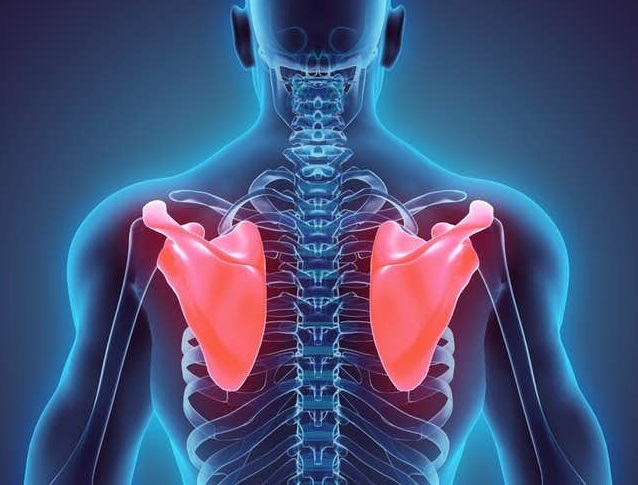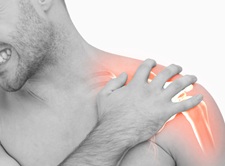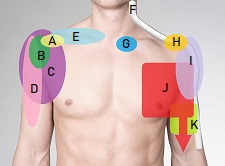- Home
- Diagnosis Guide
Shoulder Pain Diagnosis
Written By: Chloe Wilson BSc (Hons) Physiotherapy
Reviewed By: SPE Medical Review Board
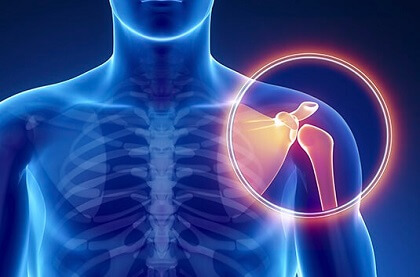
Shoulder pain diagnosis is all about working out what is causing your pain so you can treat it effectively.
There are lots of possible causes of shoulder pain. There might be a problem with one of the bones, some soft tissue damage or inflammation or the pain may be referred from elsewhere.
The simplest place to start with shoulder pain diagnosis is to think about whereabouts in your arm the majority of your pain is. Some shoulder problems will cause pain in a very specific spot, others will be much more general.
Shoulder Pain Diagnosis Guide
One of the best places to start with shoulder pain diagnosis is to think about where the pain is and what other symptoms you have.
1. Front Shoulder Pain
Pain on the front of the shoulder is a common problem. It may come on suddenly due to an injury such as a fall or heavy lifting, or more gradually, particularly if you do lots of repetitive overhead activities.
You can find out all about the most common causes in the front shoulder pain article, including how to tell what is wrong and what to do about it.
2. Top Of Shoulder Pain
Pain on top of the shoulder can indicate a number of things. There might be very localised shoulder pain right on top of the joint or the pain might spread around the shoulder and even down the arm to the hand.
Find Out More: Pain On Top Of Shoulder
3. Upper Arm Pain
Upper arm pain is usually caused by a problem inside the shoulder joint or the surrounding muscles.
Inflammation of the soft tissues is a common problem here and movement is often restricted.
Find Out More: Upper Arm Pain
4. Pain Behind Shoulder
Back of shoulder pain may be caused by a problem in the shoulder joint itself, the shoulder blades or may be referred pain from the neck.
Pain behind the shoulder may be very localised or may be quite diffuse, and may even extend down the back of the arm.
Find Out More: Back Of Shoulder Pain
5. Arm Nerve Pain
When there is nerve damage in the neck or arm, shoulder pain is often accompanied by symptoms that extend down the arm.
If you experience any tingling, pins and needles, weakness or numbness in the arm or hand, it is likely there is some nerve damage.
Find Out More: Arm Nerve Pain
6. Collar Bone Pain
The collar bone, aka clavicle, is the thin bone that runs in front of the upper ribs between the shoulder and the breast bone, aka sternum. Pain felt across the front of the upper chest is often due to a problem with the collar bone.
Find Out More: Collar Bone Pain
7. Shoulder Blade Pain
The shoulder blades rest over the back of the rib cage and play a really important role in controlling shoulder movement.
If the shoulder blades can’t glide freely over the ribs then friction results in pain and inflammation.
Find Out More: Shoulder Blade Pain
8. Trapezius Pain
The trapezius is a large muscle that covers the neck, shoulder, upper and middle back. It plays a vital role in posture, neck and shoulder movements and shoulder blade movement and stability.
Poor posture, stress and extended computer or phone use often leads to tightness, tension, muscle strain and pain in the traps.
Find Out More: Trapezius Pain
9. Elbow Pain
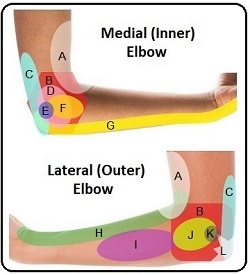
Elbow pain is a common problem and may or may not be linked with shoulder problems.
Pain at the back of the elbow may be caused by olecranon bursitis, pain in the inner elbow is usually due to medial epicondylitis or cubital tunnel syndrome and pain in the outer elbow is usually due to lateral epicondylitis, aka Tennis Elbow.
Forearm pain is typically caused by forearm tendonitis but may also be due to radial tunnel syndrome or brachioradialis pain.
You can find out more about the common causes, symptoms, diagnosis and treatment options in the elbow pain diagnosis section.
10. Sharp Pain In Shoulder
If you get a sharp pain in your shoulder, chances are something is getting squashed or structures are catching each other. Often there is an underlying dull ache but you get a sharp pain when moving your arm in certain directions as things get pinched.
There are lots of different causes which we look at in more detail in the Sharp Shoulder Pain article, including diagnosis and treatment options.
11. Pain Between The Shoulder Blades
The upper back area between the shoulder blades is a common place to experience pain.
Common causes of pain here are muscle strain or poor posture but it can indicate a serious underlying medical issue.
Find Out More: Pain Between Shoulder Blades
12. Shoulder Pain When Lifting Arm
It is really common to get shoulder pain when lifting your arms either forwards, sideways or above your head. In most cases, pain lifting arms up is due to something in the shoulder being torn, inflamed or getting pinched.
Find Out More: Shoulder Pain When Lifting Arms
13. Left Arm Pain
Pain in your left arm tends to ring alarm bells and everyone’s first thought is that they might be having a heart attack. While this may be the case, there are lots of other possible causes.
Find Out More: Left Arm Pain
14. Burning Shoulder Pain
If there is a burning sensation in or around your shoulder there is a strong chance the pain is coming from your neck or one of the nerves that travels down your arm, even if you don’t have any pain in your neck.
In the burning shoulder pain section we look at how to tell whether the pain is coming from your neck or your shoulder so you can hone in on a shoulder pain diagnosis.
15. Shoulder Pain At Night

Many people with shoulder problems have difficulty getting a good night's sleep.
It may be that the pain gets gradually worse during the day, that you only notice it at night or that the pain wakes you up, a particularly common problem if you to sleep on your side.
In the shoulder pain at night article, we look at the common causes, why pain typically gets worse at night and how to beat it.
16. Lump On Shoulder
Some people develop lumps and bumps around their shoulder. There may be one lump or multiple lumps, they may be soft or hard, painful or painless, big or small. There are a whole range of things that can cause shoulder lumps.
In the Shoulder Lumps article, we look at the common causes, how to treat them and when you need to see your doctor.
17. Shoulder Clicking & Popping
Lots of people experience shoulder clicking, popping, cracking or grinding which may or may not be associated with shoulder pain.
In the shoulder clicking article we look at the common causes of noisy shoulder, how to work out what is causing yours and how to treat them.
18. Pain From Shoulder To Hand
People often experience shoulder pain radiating down the arm, often associated with other symptoms such as tingling, weakness or numbness.
In the Radiating Shoulder Pain article we look at the common causes of pain from the shoulder to the wrist and hand and how to treat them.
19. Wrist Pain
Wrist pain is a common problem which may start suddenly, usually due to a fall or direct blow, or gradually from repetitive overuse or an underlying medical condition.
In the wrist pain chart diagnosis section we help you work out what is causing your wrist pain so you can get the right treatment.
Common Shoulder Symptoms
Another option with shoulder pain diagnosis is to think about the associated symptoms. Often it can be really hard to pin point where the pain is originating from and it may move around. When this is the case it can help to think a bit more about how it feels e.g. burning, dull or stabbing pain, or any specific symptoms you are getting such as tinging, numbness or weakness.
To make a shoulder pain diagnosis from your symptoms:
- Pain Is Worse With Overhead Activities: bicipital tendonitis, impingement syndrome, SLAP tear, rotator cuff tear, swimmers shoulder
- Shoulder Pain Worse At Night: bicipital tendonitis, brachial neuritis, fracture, impingement syndrome, bursitis, SLAP tear
- Sharp, Stabbing Pain: brachial neuritis, nerve compression, labrum tear
- Profound Weakness In Arm: brachial neuritis, full thickness rotator cuff tear, nerve compression
- Visible Shoulder Deformity: fractured clavicle, humeral fracture
- Unable To Lift Arm Above Shoulder Height: fracture, frozen shoulder
- Catching Pain with Arm Movements: impingement syndrome, SLAP tear, supraspinatus tendonitis, labrum tear
- Painful Arc In Shoulder: pain when moving the arm around shoulder height that eases above or below this level is usually from impingement syndrome or supraspinatus tendonitis
- Persistent Restricted Shoulder Movement: stiffness that lasts for several months often indicates a frozen shoulder
- Recurrent Shoulder Dislocations: instability due to labrum tear
- Strange Noises With Shoulder Movement: Snapping Scapular Syndrome, rotator cuff tear, tendonitis, labrum tear
You can also check out our shoulder pain diagnosis charts, elbow pain diagnosis charts and wrist pain chart for help working out what is wrong.
When Should You See A Doctor?
The best way to get an accurate shoulder pain diagnosis is to see your doctor. If your shoulder pain is fairly minor and your arm movements are not particularly limited, you can try self-managing your symptoms at home. Talk to your pharmacist about medication, try using ice or heat packs. Try to avoid any heavy lifting, but do keep your shoulder gently moving. Resting it completely can actually make things worse.
See you regular doctor if:
- Your shoulder pain isn’t improving after 2 weeks
- It’s difficult to move your arm
- You’re having difficulty sleeping
- You get a snapping, popping or clicking sensation when moving your arm
- You are struggling with daily activities
Seek urgent medical attention if:
- You have severe or sudden shoulder pain
- You are unable to move your arm
- There is an obvious deformity or major swelling
- You had an accident such as a fall
- You have tingling or numbness that doesn’t go away
- You feel feverish or unwell
- Any visual disturbance e.g. double vision or blurred vision
- Any problems with speech or swallowing
- Your arm is hot or cold to touch
- You have any shortness of breath or tightness in your chest
Your doctor will arrange for any necessary test or scans to confirm your shoulder pain diagnosis and can then advise you on self-management or refer your on for care e.g. with a physical therapist or orthopedic surgeon.
Why Is Shoulder Pain So Common?
The shoulder is the most mobile joint in the whole body – think how much more movement there is in your shoulder than your knee. To achieve all this movement the joint has to sacrifice stability for mobility, making it prone to injury. And to make things more complicated, the shoulder is very close to the neck and it is common for neck problems to cause shoulder pain, even in people when there is no pain in the neck itself.
One of the most common reasons that people with shoulder pain fail to respond to treatment is incorrect diagnosis so for anyone with shoulder pain diagnosis is key.
More On Shoulder Pain Diagnosis
Shoulder pain diagnosis is complex. There are a number of different structures in and around the shoulder that cause pain when they are damaged. Pain often comes and goes, moves around and fells different at different times making it difficult to accurately diagnose shoulder pain. Movement will be affected in different directions depending on the structures at fault - find out more in the shoulder range of motion article.
If you are still not sure what is causing your shoulder pain, it is definitely worth seeing your doctor. Remember, the most effective treatment comes on the back of a good shoulder pain diagnosis. You can also take a look at our shoulder pain diagnosis charts, elbow pain diagrams and wrist pain charts.
Related Articles
Medical & Scientific References
British Medical Journal (BMJ) - Shoulder Pain: Diagnosis & Management in Primary Care. C. Mitchell, E. Hay & A. Carr
Page Last Updated: February 11th, 2025
Next Review Due: February 11th, 2027

